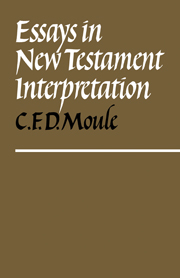Book contents
- Frontmatter
- Contents
- Foreword
- Acknowledgements
- Abbreviations
- Jesus in early Christian interpretation
- Studies in the Gospels
- Two studies in the Epistles
- Two linguistic studies
- Studies exegetical, doctrinal and ethical
- 12 The influence of circumstances on the use of christological terms
- 13 The influence of circumstances on the use of eschatological terms
- 14 St Paul and ‘dualism’: the Pauline conception of resurrection
- 15 A reconsideration of the context of maranatha
- 16 II Cor. iii.18b, καθάπερ ἀπὸ κυρίου πνεύματος
- 17 Punishment and retribution: an attempt to delimit their scope in New Testament thought
- 18 The theology of forgiveness
- 19 Obligation in the ethic of Paul
- 20 ‘…As we forgive…’: a note on the distinction between deserts and capacity in the understanding of forgiveness
- 21 The sacrifice of the People of God
- Index
12 - The influence of circumstances on the use of christological terms
Published online by Cambridge University Press: 05 November 2011
- Frontmatter
- Contents
- Foreword
- Acknowledgements
- Abbreviations
- Jesus in early Christian interpretation
- Studies in the Gospels
- Two studies in the Epistles
- Two linguistic studies
- Studies exegetical, doctrinal and ethical
- 12 The influence of circumstances on the use of christological terms
- 13 The influence of circumstances on the use of eschatological terms
- 14 St Paul and ‘dualism’: the Pauline conception of resurrection
- 15 A reconsideration of the context of maranatha
- 16 II Cor. iii.18b, καθάπερ ἀπὸ κυρίου πνεύματος
- 17 Punishment and retribution: an attempt to delimit their scope in New Testament thought
- 18 The theology of forgiveness
- 19 Obligation in the ethic of Paul
- 20 ‘…As we forgive…’: a note on the distinction between deserts and capacity in the understanding of forgiveness
- 21 The sacrifice of the People of God
- Index
Summary
Much attention has always been paid by New Testament theology to the names and titles applied to Jesus. Dr Vincent Taylor's monograph on The Names of Jesus is a recent example of this approach, and still more recently, Dr Oscar Cullmann's work on Christology has in some respects followed the same method. The intention of this essay, however, is not to traverse precisely this ground once more, but rather, moving selectively over parts of it, to inquire into the reasons for the appearance and disappearance, for the advance and retreat, of one title and another. In other words, it will try to relate the names and designations of Jesus to the circumstances and conditions of their use.
Two notoriously difficult problems in this connexion are, of course, the strikingly limited occurrence of the term ‘the Son of Man’, and the comparative rarity with which the figure of the suffering Servant is applied to Christ. Why, for instance, is there in early Christian apologetic outside the gospels no application to Jesus of a full-length testimonium from Dan. vii? Or again, Isa. liii is almost the only Old Testament passage which seems to recognize innocent suffering as possessing redemptive power. Why, then, are direct references to Isa. liii in the gospels so very rare? Why are the occurrences scarcely less meagre in the whole of the rest of the New Testament? And – most surprising of all – why are the explicitly redemptive phrases from Isa. liii only quoted once or twice in all?
- Type
- Chapter
- Information
- Essays in New Testament Interpretation , pp. 165 - 183Publisher: Cambridge University PressPrint publication year: 1982

